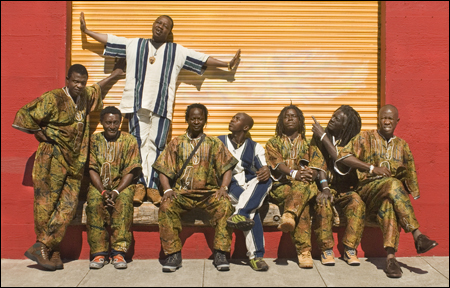
LIVING LIKE A REFUGEE “Today you settle, tomorrow you pack,” was the All Stars’ mantra. |
In 2002, American filmmakers Zach Niles and Banker White were moving through the refugee camps of Guinea looking for musicians to help them dramatize the plight of Liberians and Sierra Leoneans who had fled civil wars back home. They hit paydirt when they came upon singer Reuben Koroma and guitarist Francis “Franco” Langba working out a plaintive reggae number called “Living like a Refugee.” In the film that resulted — The Refugee All Stars — Koroma and Langba build their collaboration into a punchy, electric band who tour the camps to entertain fellow refugees, return anxiously to Freetown to test the peace and record an album, then head back to the camps to encourage refugees to return home. That band, Sierra Leone’s Refugee All Stars, have come a long way in four years. They’re now in the US with a debut CD, Living like a Refugee (Anti-), on a tour that comes to the Paradise this Wednesday.
The arrival of the American filmmakers must have seemed miraculous, “something strange happening into our lives,” as Koroma puts it. Indeed, it was Niles and White who persuaded the band to return to Freetown. “We were so much reluctant to go back, owing to the kinds of things we saw,” Koroma admits, alluding to the killings and maimings that had been so common. But it was in Freetown that he reconnected with guitarist/singer Ashade Pearce and other musicians he had worked with before the war, musicians who completed the Refugee All Stars line-up.
Living like a Refugee is actually a compilation that brings together 17 tracks recorded over several years, from the earliest acoustic tracks made by Niles and White in the camps to more polished studio productions done in Freetown in 2003 and 2004. The Koroma/Langba connection goes back to 1998 in the Kalia camp. “I had nothing to do,” Koroma recalls. “I saw that many people were not happy, and I thought, ‘If I start to play music here, people will really feel well.’ ” The duo’s warm vocal harmonies are a highlight. And there’s an urgency in “Compliments for the Peace” and “Monkey Work” that echoes early Wailers tracks. But it would be a mistake to label this reggae. As Koroma points out, Sierra Leone’s own playful baskeda folk music is close to reggae in sound and spirit. “Anytime something is not good for the community, people will make a song of it, and when they are playing the baskeda, they will sing it. If the chief is very bad, they will sing against him, but the chief will not do anything because this is a social time. So people have the chance to speak, to express their grievances.”
There’s also palm wine, the freestyle, celebratory style associated with the local drink poyo; the signature lilt of the legendary palm-wine troubadour S.E. Rogie pervades a number of the songs. There are traces of gumbe, a style brought back from the Americas by slaves returning in the years after abolition; “Kele Mani (War Is Not Good)” is lively gumbe, animated by bottle and hand-drum percussion and an ancient-sounding acoustic guitar. “Pat Malonthone,” with its brooding, ritualistic feel and chant vocals, is an example of gbute vange, a music of the Mende people.